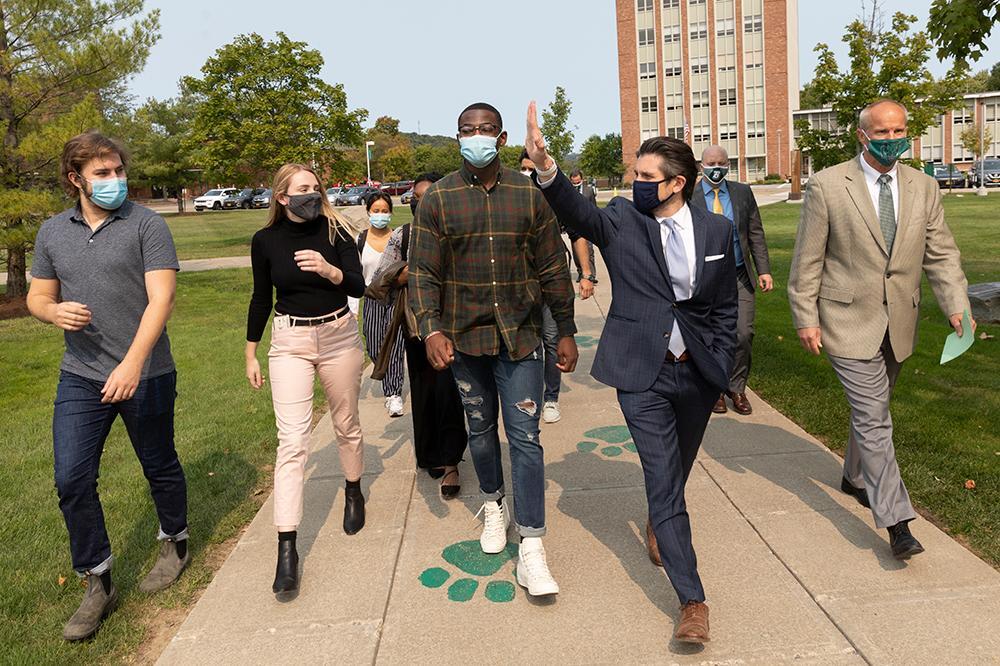As Binghamton University enters its fourth week of classes utilizing a hybrid model, the positive test rate for the coronavirus remains low compared to other SUNY schools. However, student compliance is still an issue on the University’s radar.
According to a Sept. 18 B-Line News Addition from Brian Rose, vice president for student affairs, “269 students have been issued formal warnings, 14 have been removed from housing, nine have been barred from campus/in-person classes and almost 90 more face campus bans for failing to report for testing.” Although reaching the fourth week of classes is a milestone, Rose wrote that the University is facing challenges with off-campus events.
“I understand the temptation to socialize in larger groups,” Rose wrote. “I understand how face coverings and social distancing work against the atmosphere most of us would want at a party. I even understand that the parties that are happening are smaller in scale than they would be in ordinary times. The problem remains that the gatherings we know are happening still present too great a risk of an outbreak of the virus that we would not be able to contain while staying in person. That means we have to do more to discourage them.”
BU will continue patrolling off-campus student areas both during the week and on weekends. Students who are members of organizations reported to have potentially hosted noncompliant gatherings should expect to be included within the surveillance testing pool of students, according to Rose.
“We ask you to cooperate,” Rose wrote. “Don’t plan large events that are non-compliant and intentionally try and hide them. If you don’t care what the University wants you to do, at least think of those students for whom a return home would mean going back to a place where the learning environment doesn’t work for them — too many people, too little space, poor internet, no help and competing family responsibilities. They want to stay here — respect them.”
The B-Line News Addition comes a few days after SUNY Chancellor James Malatras visited BU. Malatras succeeded Kristina M. Johnson this past August after being president of SUNY Empire State College, a distance-learning university.
According to a BingUNews article, Malatras believed that BU, along with Broome Community College, are model schools for how to handle the coronavirus pandemic.
“This is a campus where testing is going well and everyone is united in moving forward,” Malatras said. “You’re showing that a public institution can do this well and I hope it will ripple across the entire system and elevate all of the good things that are happening. We have to be unified and change as we need to change, remaining flexible, but you’re doing it well here.”
In accordance with New York State Gov. Andrew M. Cuomo, SUNY schools that reach 100 confirmed COVID-19 cases within two weeks must move to solely remote learning. SUNY Oneonta already moved to a completely remote model after less than two weeks of in-person classes. Over 500 of its students had tested positive for COVID-19. SUNY Oswego has also moved to a remote model for two weeks after roughly 122 cases were confirmed within less than a two-week timeframe.
Resident assistant Liza Intskirveli, a junior majoring in psychology, said she is grateful that BU has not shut down or had a spike in positive cases.
“I think the University handled the pandemic very well, with testing and setting in place certain rules,” Intskirveli said. “We are doing a lot better than many schools. Personally I feel safe, and for the safety of others, the right thing to do is report compliance issues. I think it’s important to do your part and for the community to work together to keep the whole school safe.”
Ariel Liebb, a junior majoring in integrative neuroscience, expressed concern about the testing occurring on campus. While he feels the University took a step in the right direction by testing all students, he has concerns about the accuracy of the tests BU conducts.
“Living off campus has [made it] difficult to get tested for COVID-19 because most places on campus, especially [Decker Student Health Services Center], rejects anyone off campus unless they have symptoms, which is very frustrating if you need to get tested [and] you are a [BU] student [who pays] the Decker Health Student Services fee,” Liebb wrote. “If I pay the fee, then I should also be allowed to get tested, but if I can’t because I live off campus, then I shouldn’t have to pay a health service fee. Obviously, it’s an uncontrollable and unpredictable situation, and there’s so much that rules and enforcement can do. At the end of the day, a lot of it [lies] on the students and every individual to comply for the safety of everyone.”
Rose added that students are encouraged to continue providing BU with “specific and actionable information about parties and events that violate guidelines.”
Despite this encouragement, Liebb said he feels that people may still not come forward.
“Personally I don’t feel comfortable [tattling] on others,” Liebb wrote. ”I don’t think it’s my place.”
Rose added that while he did not feel comfortable directing some of the actions the University is enforcing, compliance must improve from what the University has seen so far this semester.
“Sometimes doing the right thing is hard,” Rose wrote. “It is right to live within the public health constraints that have been established for us, and it is right to hold accountable those who intentionally refuse, and both are hard to do. I hope more of you will join those that are already accepting the responsibility to do what is right, however difficult that may be. I look forward to the day we can all return to an old normal.”



